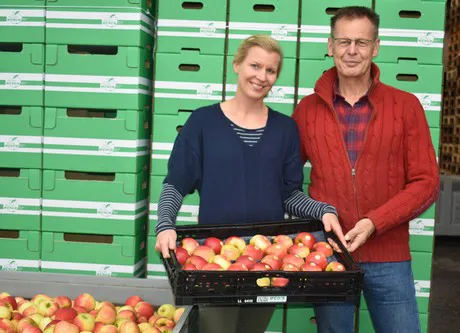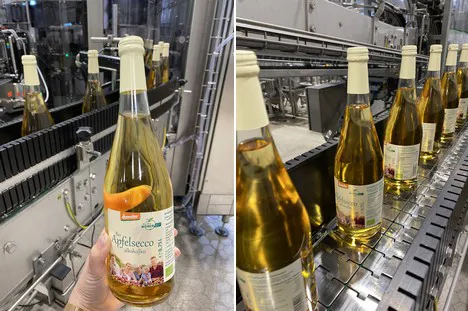For 40 years now, Bio-Obsthof Münch has been dedicated to the cultivation of organic dessert fruit. In recent years, the organic pioneer has increasingly relied on by-products to add value to the organic fruit it produces itself. The company's latest refinement product is a non-alcoholic apple sparkling wine that meets today's zeitgeist, says farm manager Marco Bartels.
"It seems that people are drinking less alcohol," says Marco Bartels of Bio-Obst Münch from Neuenfelde. Since last fall, these eco-pioneers have been marketing their alcohol-free apple sparkling wine. The intermediate result after the first sales months is quite pleasing, says Bartels. This is due not least to the decline in alcohol consumption in society, as shown by figures from the Federal Statistical Office. At the same time, sales of cider, fruit wine, cider and other apple- and fruit wine-based beverages are on the up. The market share of non-alcoholic sparkling wine is five percent and rising. Daughter Marie and father Claus-Peter Münch during Freshplaza's 2018 visit
Daughter Marie and father Claus-Peter Münch during Freshplaza's 2018 visit
Further processing of selected varieties
The aforementioned developments clearly play into Biohof Münch's cards when it comes to marketing their sparkling wine. Nevertheless, only part of their own yields can be refined into sparkling wine, as not every variety is suitable for further processing, says Bartels. "A balanced sweetness-acid ratio is important, which is why apples of the Elstar, Holsteiner Cox and Boskoop varieties are processed predominantly. The taste of the sparkling wine can vary somewhat from year to year; apple sparkling wine is, after all, a product of nature."
This month, an apple secco with alcohol will follow: a so-called sparkling apple wine with added carbon dioxide. The Münchs are currently distilling the second batch of their organic apple brandy 'Apfler'. Incidentally, 16 kilograms of apples go into one liter of this high-proof spirit. The Demeter Apple Secco is already listed in almost all food and organic markets in the region. It consists of 99.6 percent apple juice, the rest is carbonic acid. True to the motto 'pure apple',
no flavorings are added.

Fresh apple secco from Biohof Münch is well received by younger consumers
Opening up new markets
The fruit farms in the region - including Biohof Münch - have a decades-long tradition of pome fruit cultivation. Further processing into beverages is not intended to replace the dessert fruit business, but rather to strengthen it. According to Bartels, it is an additional mainstay, so that the younger generation also enjoys and appreciates the local pome fruit, even if in a different form than the tried and tested dessert fruit.
For more information:
Marco Bartels
Bio Obst Münch GmbH & Co. KG
Siebenhöfen 29
21723 Hollern
Tel.: 04141 - 70610
Fax: 04141 - 76775
[email protected]
www.bioobstmuench.de
